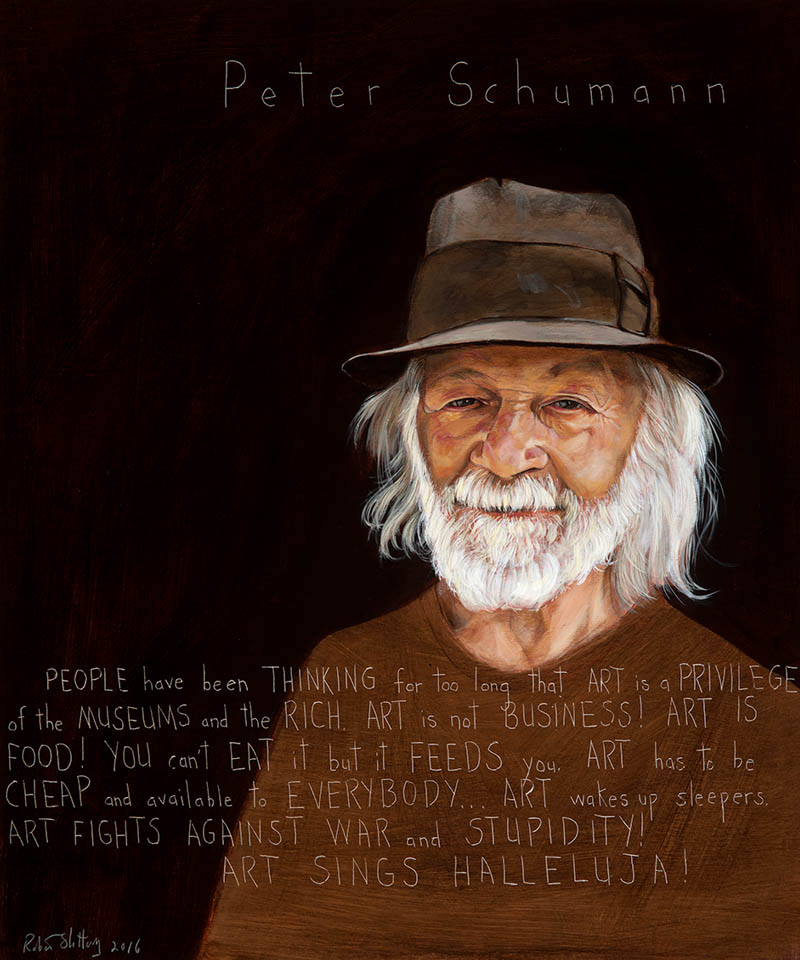
Peter Schumann
Artist : b. 1934
“PEOPLE have been THINKING for too long that ART is a PRIVILEGE of the MUSEUMS and the RICH. ART is not BUSINESS! ART IS FOOD! YOU can’t EAT it but it FEEDS you. ART has to be CHEAP and available to EVERYBODY… ART wakes up sleepers. ART FIGHTS AGAINST WAR and STUPIDITY! ART SINGS HALLELUJA!”
Biography
“We have two types of puppet shows: good ones and bad ones, but all of them are for good and against evil.” Peter Schumann
In 1961, Peter Schumann, a dancer, sculptor and baker, emigrated to America from Silesia, Germany. Just two years later he founded the Bread and Puppet Theater in the Lower East Side of New York City.
Schumann merged his artistic and culinary skills with his interest in social change to set the foundation for the theater. Bread and even more food for thought were served from the stage. “Bread and Puppet is based on bread baking and the not-for-sale distribution of bread at moments created by art, and these moments are created in opposition to capitalist culture and habit—We give you a piece of bread with the puppet show because our bread and theater belong together. For a long time the theater arts have been separated from the stomach. Theater was entertainment. Entertainment was meant for the skin. Bread was meant for the stomach,” said Schumann.
There are not too many things that have been deemed ‘larger than life’ but that is one of the best ways to describe Peter Schumann’s Bread and Puppet Theater. Schumann puppets are brought to life with paper mache, clay, strings, poles and painted facial expressions that portray raw emotions. Over time the puppets grew larger and larger and could be seen in Holiday shows, parades, and political demonstrations around New York.
Schumann once said, “We want you to understand that theater is not yet an established form, not the place of commerce you think it is, where you pay to get something. Theater is different. It is more like bread, more like a necessity. Theater is a form of religion. It preaches sermons and builds a self-sufficient ritual.”
The sermons Schumann spoke of were ones that he and his theater brought to the stage and took into the streets. During the Vietnam War they organized shows that protested the war through the streets of New York City. Life-sized puppets with body-boards with messages written on them stood in solidarity with people who had the power to vote, chant and be heard. They also shed light on issues around policing, poverty, high rents and the infestation of rats in the city. Community members, young and old, supported the theater’s commitment to social good.
“Puppet theater is the theater of all means. Puppets and masks…are louder than the traffic. They don’t teach problems, but they scream and dance and display life in its clearest terms. Puppet theater is of action rather than dialogue. The action is reduced to the simplest dance-like and specialized gestures. A puppet may be a hand only, or it may be a complicated body of many heads, hands, rods and fabric. We have two types of puppet shows: good ones and bad ones, but all of them are for good and against evil,” said Schumann.
In 1974, the theater moved to a 140-year old hay farm in Glover, Vermont. The barn was transformed into a puppet museum. Up until 1998, Schumann hosted a two-day outdoor circus named the Domestic Resurrection Circus in the rolling fields across from the barn. Many thousands of people attended and were invited to participate. Bread and Puppet continues to tour new and old productions. Much of their operating revenue comes from the sale of hand printed posters, banners, cards and broadsides which can be found in their online store. The centerpiece of Schumann’s philosophy about art is that it should be cheap, available to all people, and that it should be a gift of the artist to the maintenance of healthy, peaceful and joyous community. On YouTube one can find video of Bread and Puppet performances. And on Google Images are many examples of the art.
Bread and Puppet is regarded as one the oldest and most successful non-profit theater companies in the world. Peter Schumann’s art has influenced two generations of political art making the world over.
Programs
Americans Who Tell the Truth (AWTT) offers a variety of ways to engage with its portraits and portrait subjects. Host an exhibit, use our free lesson plans and educational programs, or engage with a member of the AWTT team or portrait subjects.

Education
AWTT has educational materials and lesson plans that ask students to grapple with truth, justice, and freedom.

Exhibits & Community Engagement
AWTT encourages community engagement programs and exhibits accompanied by public events that stimulate dialogue around citizenship, education, and activism.